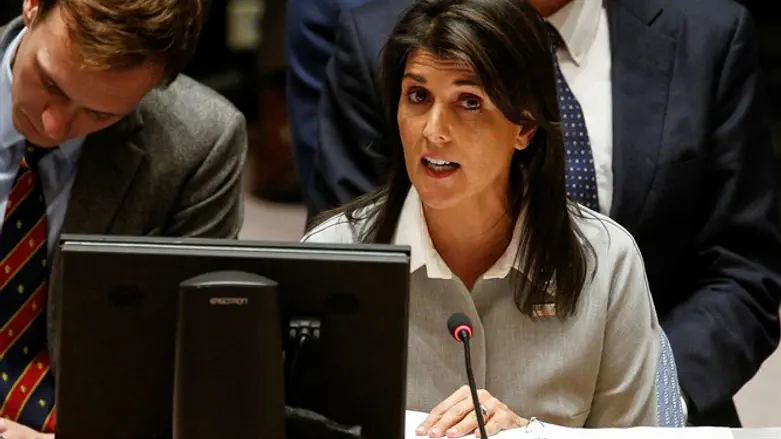
International action on Iran's ballistic missile program could persuade U.S. President Donald Trump to remain in the Iranian nuclear deal, UN Ambassador Nikki Haley said Monday, according to The Associated Press.
Haley, who brought fellow Security Council ambassadors on a field trip to Washington, suggested that a concerted global effort to punish Iran for violating Security Council resolutions on ballistic missiles could persuade Trump it was worthwhile to remain in the nuclear deal.
She noted that France, a key member of the group that negotiated the 2015 nuclear deal, had recently “started hitting” Iran rhetorically for violating ballistic missile resolutions.
Trump recently decided to extend a waiver on nuclear sanctions that were imposed on Iran. However, he said it would be the last time he will do so and ordered European allies and Congress to work with him to fix “the disastrous flaws” in the 2015 deal or Washington would withdraw.
Trump has repeatedly criticized the Iran deal, one of his predecessor’s Barack Obama’s signature foreign policy achievements, as the worst ever negotiated by the U.S.
However, European countries have failed to see eye to eye with Trump on the nuclear deal and have expressed their support for the deal even as Trump has criticized it.
But Iran's nuclear aspirations are not the only concern for the international community. The Islamic Republic has several times test-fired ballistic missiles in recent months, raising the ire of the West.
Western countries say the tests are a violation of the UN resolution enshrining the 2015 nuclear deal. In it, Iran is “called upon” to refrain from work on ballistic missiles designed to deliver nuclear weapons for up to eight years.
Iranian officials, including, President Hassan Rouhani, have stressed that Iran will continue to produce missiles for its defense and does not consider that a violation of international agreements.
Speaking Monday after her meeting with the ambassadors, Haley said, “It’s working. They’re starting to realize, ‘If we don’t start talking about the violations, if we don’t call them out, then the U.S. is going to say this whole thing is a sham.'”
Haley brought the other Security Council envoys to a U.S. military base in Washington to view missile parts that the U.S. calls evidence of Iran’s illicit transfer of prohibited missiles to Iran-backed Houthi rebels in Yemen.
The Trump administration maintains that fragments from those missiles, recovered in Saudi Arabia after being launched from Yemen by the Houthis, contain markings proving they were Iranian-made, though some security experts have questioned whether the evidence is foolproof. Iran denies it is backing the Houthis.
China and Russia, two Security Council nations that are part of the nuclear deal, have been particularly reluctant to impose additional conditions on Iran, and have cast doubt on U.S. allegations that Tehran is funneling weapons to the Houthis to be used against American allies like Saudi Arabia, noted AP. Haley said that skepticism came across as their ambassadors viewed the missile parts on display in Washington.
“The Chinese just took notes,” Haley said. “The Russians questioned the missiles, how they got to Yemen.”
Haley’s message to the Russians was: “How do you dispute this? It’s got ‘Made in Iran’ welded on it,” she said, referring figuratively to markings on the missiles that U.S. defense officials say suggest Iranian origin.

